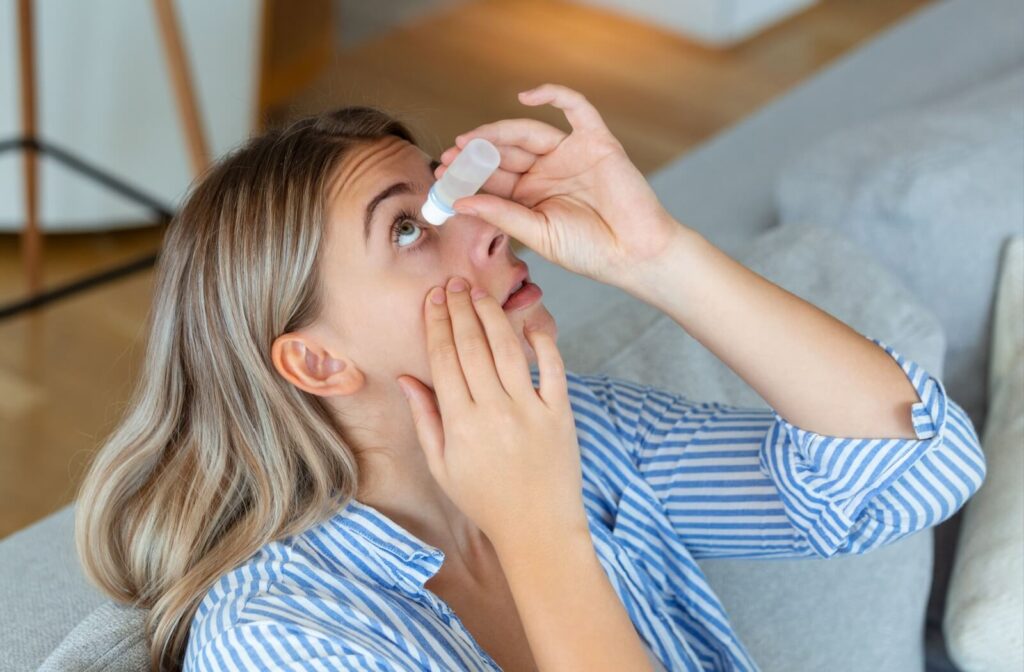We rely on our vision for so much, so it’s only natural to feel concerned when things start to look blurry. One common reason for blurry vision is dry eye, a condition that affects many people, particularly in dry climates like Alberta’s.
An unstable tear film on the surface of your eye can prevent light from focusing correctly, which can make your vision blurry. While dry eye is a common cause of this kind of vision issue, it can be managed with the guidance of an optometrist.
The Connection Between Dry Eye and Blurry Vision
Your eyes need a smooth, stable layer of tears, called the tear film, to see clearly. This tear film covers the cornea (the transparent front surface of your eye) and helps focus light properly. If your eyes don’t produce enough tears, or if the tears are of poor quality, light scatters instead of focusing as it enters your eye, causing your vision to seem blurry or filmy.
Common Symptoms of Dry Eye
Blurry vision from dry eye is often accompanied by other symptoms. You might also experience:
- A stinging or burning sensation
- Feeling like there’s something in your eyes
- Redness and irritation
- Watery eyes, which is the body’s response to irritation
- Stringy mucus in or around the eyes
- Sensitivity to light
- Discomfort while wearing contact lenses
When Blurriness May Point to Dry Eye
A key sign that dry eye might be the cause of your blurry vision is if your sight changes throughout the day. For instance, your vision clears up for a moment right after you blink. The blurriness may also get worse after long periods of screen time, reading, or toward the end of the day.
Other Possible Reasons for Blurry Vision
While dry eye can be a cause of blurriness, it’s not the only one. It’s helpful to be aware of other factors that can affect your vision.
Refractive Errors and Age-Related Changes
The most common reasons for blurry vision are refractive errors (problems in the way light bends as it enters your eye), such as nearsightedness, farsightedness, and astigmatism. Your vision also changes as you get older, and an outdated prescription for glasses or contacts can lead to a loss of focus.
If your glasses or contact lens prescription isn’t correct, it can cause vision fluctuations, like blurriness that comes and goes, which can feel similar to the symptoms of dry eye.
Dry Eyes and Astigmatism: How They’re Connected
Dry eye can also affect your glasses prescription, particularly if you have astigmatism. When the tear film is unstable, the surface of the cornea becomes irregular, causing astigmatism to fluctuate or appear worse. This can make your prescription feel inconsistent or unstable throughout the day. Managing dry eye is an important step in keeping your prescription stable and preventing astigmatism from progressing due to surface irregularity.
Other Eye and Health Conditions
Blurry vision can sometimes be a symptom of other conditions. Cataracts can cause the eye’s lens to become cloudy, while conditions such as diabetic retinopathy or glaucoma can also affect how you see. Certain medications or autoimmune conditions may contribute to both dry eye and blurry vision.

How Your Optometrist Assesses Your Eyes
To figure out what’s causing your blurry vision, an optometrist performs an examination. This process involves more than just checking your prescription. It’s a detailed look at the health of your eyes to help identify the cause of your symptoms.
Your Eye Health and History
Your appointment will start with a conversation tailored to you. You and your optometrist will talk about your symptoms, overall health, any medications you’re taking, and your daily routine. This information helps your optometrist get a complete picture of factors that could affect your eyes.
Specialized Tests for Dry Eye
If your optometrist suspects dry eye, specific tests can help confirm it. A tear breakup time test (TBUT) may be used, which measures how quickly your tear film evaporates after blinking to assess any issues with how fast your eyes might dry up.
Another test we can perform is a tear film analysis, which can give the optometrist more insight into the makeup of your tears. This helps us know what might be missing from your tears. These assessments help identify the root cause of your dry eye so that a tailored treatment plan can be made.
Treatment Options for Dry Eye
The right approach to treatment depends on the cause and severity of your dry eye. Your optometrist can recommend the most suitable options for your needs.
In-Office Treatments
We offer the following dry eye treatments in our clinic:
- Prescription eye drops: Medicated drops that can help with tear production and inflammation reduction
- IPL treatment: Use gentle pulses of light to reduce eyelid inflammation and warm the Meibomian glands, helping soften clogged oil and improve tear quality.
- Radiofrequency (RF) therapy: A gentle eyelid heating treatment which can improve gland function
- Punctal plugs: Tiny devices which are inserted into the tear ducts to block drainage to help keep eyes moist
Tips for Daily Eye Comfort and Care
Once you have a treatment plan, a few simple habits can help you manage your symptoms and protect your eyes on a daily basis. These small steps can support your overall eye health and comfort. They work alongside your treatment to help you find lasting relief.
Protect Your Eyes from the Elements
Wear wraparound sunglasses when you’re outside. They help shield your eyes from wind, dust, and sun, all of which can make dry eye feel worse. This is especially helpful during windy Calgary days.
Getting Help from an Optometrist
For many people, the blurriness from dry eye is temporary. It often improves with consistent treatment. By addressing the underlying dry eye condition, it is possible to keep your eyes comfortable day to day.
If you’re experiencing blurry vision or other symptoms of dry eye, you don’t have to just live with the discomfort. At Sun Valley Eye Care, we are committed to helping find the source of your vision concerns with a problem-solving approach unique to you. Schedule your eye exam with our optometrist in Calgary today, and let us help you find the clarity you deserve.










